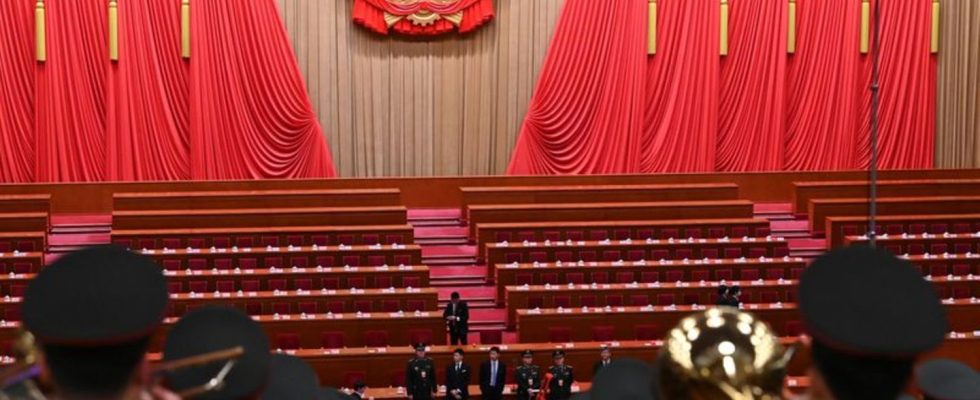Government
China’s People’s Congress ends: Higher military budget approved
The People’s Liberation Army Chapel is located in the plenary chamber of the Great Hall of the People. The National People’s Congress has ended. photo
© Johannes Neudecker/dpa
The People’s Congress in Beijing showed that the leadership is sticking to its long-term plans, both economically and militarily. Meanwhile, transparency is moving further and further into the background.
More money for the military, an ambitious growth target and a canceled press conference: With clear signals about the future course China’s Beijing People’s Congress ended on Monday. As expected, the approximately 2,900 delegates in the Great Hall of the People approved the budget with an overwhelming majority, which calls for a sharp increase in defense spending this year by 7.2 percent to 1.67 trillion yuan (around 214 billion euros).
China’s military spending had already increased by the same amount in the previous year. The renewed sharp increase comes against the backdrop of the communist leadership’s threats against democratic Taiwan and China’s territorial disputes with its neighbors in the South and East China Seas.
Warning to Taiwan
On the sidelines of this year’s annual meeting, Foreign Minister Wang Yi had already warned urgently on Thursday against interference in the so-called Taiwan question. “Whoever supports Taiwan’s independence will burn themselves and swallow the bitter pill for their actions,” Wang said. China will never allow Taiwan to secede from the mainland. Wang described the recent parliamentary and presidential elections in Taiwan in mid-January as “local elections in a part of China.”
Lai Ching-te of the Democratic Progressive Party, which Beijing sees as separatist, won the January election. The inauguration is scheduled for May 20th. Lai replaces President Tsai Ing-wen, who also belongs to the Progressive Party but was unable to run again after two terms in office.
Taiwan’s government believes that China could exert more military and economic pressure to achieve its goal of unifying the island with the mainland. However, based on an analysis of military movements, for example, there are no signs of an impending armed conflict in the China-Taiwan Strait (Taiwan Strait), said National Security Agency Director Tsai Ming-yen on Monday in the Legislative Yuan, the parliament in Taipei . However, around Lai’s planned inauguration it is “likely” that Beijing will increase its military intimidation, economic coercion, political threats and manipulation of information.
Economy should stay on course
Meanwhile, delegates in Beijing also approved the government’s growth target of “around five percent” on Monday. Although the goal is considered ambitious, it came as no surprise to many observers. The message from the People’s Congress on the economic course this year was clear: the leadership wants to stay the course despite weakening consumption and the crisis in the real estate market. The communist leadership does not seem to be planning on providing stimulus with a lot of state money from the watering can for the world’s second largest economy.
Prominent in this year’s report were nebulous terms such as “new productive forces” and “high-quality development”, which arise from the ideological thinking of state and party leader Xi Jinping. The long-term goal behind this is to detach the success of the economy from traditional growth drivers and link it to new areas. To put it simply, China is more likely to focus on artificial intelligence or battery and solar development rather than housing and heavy industry. The country wants to invest more in high-tech and research. To this end, the People’s Republic is also planning to train more specialists in these areas. In any case, education was relatively high on the list of goals for 2024 this year.
Prime Minister does not face the press
After the closing ceremony, for the first time in more than three decades, there was no press conference by the Chinese Prime Minister on the agenda. The appointment was always a rare occasion when the head of government appeared in front of the press live on television. Although this encounter with Chinese and foreign journalists was increasingly orchestrated, and questions generally had to be submitted in advance, it also closed further access to information.
The National People’s Congress is China’s non-freely elected parliament under the exclusive rule of the Communist Party. At its annual meeting, MPs approve the plans and goals of the Chinese leadership. There are no debates about the plans. The annual meeting of parliamentarians and the parallel consultative conference, which is supposed to advise Parliament, has a more ceremonial character.
Current government announcements on the National People’s Congress, Chinese statistical report on the development of the economy and society for 2023, Chinese overview of the state-run “People’s Daily” on the government’s work report, English statement on new productive forces according to the party magazine “Qiushi”, English

